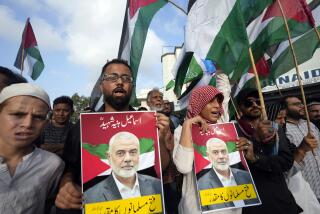Bombing Targets Lebanon Official
- Share via
BEIRUT — A leading investigator in the assassination of former Lebanese Prime Minister Rafik Hariri narrowly escaped a remote-control bomb attack that targeted his convoy and killed four of his aides and bodyguards Tuesday.
The assault threatened renewed instability in this fragile country, which is still languishing under an Israeli blockade and remnants of the military occupation that was prompted by Israel’s recent battle with Hezbollah guerrillas.
Lt. Col. Samir Shehade, deputy head of intelligence in the national police force, spent months tracking the bombers in Hariri’s 2005 killing, which sparked an outburst of political pressure that led Syria to end its longtime de facto occupation of Lebanon. He also has investigated a string of slayings of prominent anti-Syria politicians and journalists since Syria’s pullout.
Shehade was hospitalized with minor injuries after Tuesday’s attack, which occurred in the southern town of Rmaile.
Saad Hariri, the slain prime minister’s son and political heir, called the bombing “a terrorist act.”
“We as Lebanese withstood the [Israeli] aggression, we are withstanding the blockade, and we will withstand the cowardly terrorists,” he said.
Shehade’s work figures in a United Nations investigation of Hariri’s slaying, in which Syria has long been a suspect. Belgian Judge Serge Brammertz is expected to present his report to the U.N. Security Council this month.
Syria has consistently denied involvement in the killing. Even in the capital Hariri was famous for rebuilding after Lebanon’s civil war, the case has been overshadowed as people fret over how to rebuild their country and war-shattered economy.
Tuesday’s bombing was a harsh reminder of the mystery that still shrouds the string of killings, and of the unresolved tensions and suspicions between Syria and Lebanon.
Syria is unhappy over Lebanon’s plans to deploy troops along the nations’ border to choke off the flow of arms to Hezbollah, a Shiite Muslim political organization and militia that is backed by Syria and Iran.
Under the cease-fire accord that stopped the fighting between Hezbollah and Israel, U.N. and Lebanese soldiers are to move into southern Lebanon as Israeli soldiers withdraw. But the international community has been slow to offer troops, and Israel has so far refused to lift its blockade of Lebanon’s air and sea ports.
Visiting Egypt as part of a regional tour meant to shore up the shaky peace, U.N. Secretary-General Kofi Annan hinted that the standoff over the blockade might end soon.
“I don’t want to raise any false hopes, but I hope that in the next 48 hours we will have some news on that,” Annan said after meeting with Egyptian President Hosni Mubarak in the port city of Alexandria.
On Tuesday, Turkey became the first Muslim country with ties to Israel to offer troops to the peacekeeping force.
Israel’s monthlong bombing campaign drew fierce criticism in Turkey, and some have expressed concern over Turkish soldiers possibly clashing with fellow Muslims in Lebanon. Thousands of demonstrators protested as parliament voted 340 to 192 to send troops. Turkish officials were careful to frame the deployment as a humanitarian gesture made on behalf of suffering Lebanese civilians.
Observers have warned against deploying a predominantly Christian peacekeeping force in Lebanon, a country still beset by sectarian strife more than 15 years after its civil war ended. Qatar and Indonesia, both Muslim countries, have agreed to send troops, but neither country has diplomatic ties with Israel.
*
More to Read
Sign up for Essential California
The most important California stories and recommendations in your inbox every morning.
You may occasionally receive promotional content from the Los Angeles Times.












